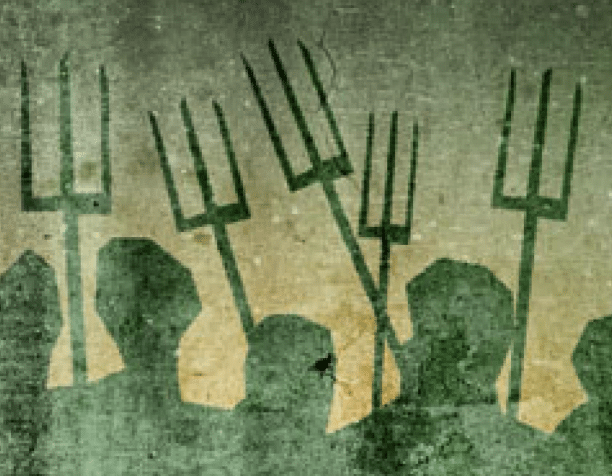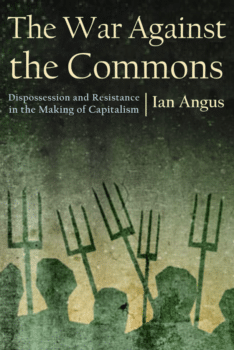In his latest book, Ian Angus answers a question that apologists for the capitalist system would like to pretend does not exist. How is it that humans came to live in a world were a tiny minority own and control huge amounts of wealth, and the vast majority of us have to work for them? Angus writes that “even sharp critics of injustice and inequality rarely question the division between owners and workers, employers and employees”. Yet almost every aspect of our world is defined by such inequality. About 50 percent of England is owned by one percent of the population. A staggering inequality for a country supposedly defined by its “green and pleasant land”. Indeed it is England were Angus’ history is mostly focused, for here it was that the process went “furthest” according to Marx. But the transformation of society that saw the total destruction of “the traditional economy” was neither automatic nor benign. Rather:
wage-labour has only become universal in the past few hundred years—and the change was forced on us by ‘the most merciless barbarism, and under the stimulus of the most infamous, the most sordid, the most petty and the most odious of passions’.
The quote here comes from Marx, and Angus skilfully uses Marx’s theoretical framework to explore the development of capitalism’s system of unrestrained accumulation based on exploitation. Marx was well aware that pre-capitalist society took a myriad of different forms, and Angus shows how England (and indeed the British Isles in general) saw a number of different ways of organising agricultural production. The peasantry, under the respective lords, farmed land in ways that were much more communal and depended, in significant part, on the use of communal land. These commons were used according to democratic and egalitarian principles, sharing fields and carefully managing access to essential resources.
The developing capitalist interests however saw the commons as a barrier to further profit. The destruction of the commons, the key theme of this book, took place not out of individual malice, but out of the logic of capital. The need, by the capitalists to expand into every available space and to transform the very world into their own image. Land, animals, wood, forests and space itself was converted into a commodity that could be bought and sold. Fields were engrossed, land was enclosed, commons were privatised. The peasants who lived from the land, were expelled or turned into wage labourers—their old traditions and histories erased. As Angus says, “The twin transformations of original expropriation—stolen land becoming capital and landless producers becoming wage workers—were well underway”. These people became a new social group:
A new class of wage-labourers was born in England when ‘great masses of men [were] suddenly and forcibly torn from their means of subsistence, and hurled onto the labour-market as free, unprotected and right-less proletarians.’
The quote is, again, from Marx, whose book Capital is filled with rage at what happened to the peasantry. Angus continues by highlighting the sweep of this process:
It was sudden for those who lost their land, but the social transformation took centuries. In the early 1700s, two hundred years after Thomas More condemned enclosures and depopulation in Utopia, about a third of England and almost all of Scotland was still unenclosed, and most people still lived and worked on the land. it took another great wave of assaults on commons and commoners, after 1750, to complete the transition to industrial capitalism… Looking back, that transition appears inevitable but it did not seem so to commoners at the time… some argued eloquently for a commons-based alternative to both feudalism and capitalism.
Contrary to what some followers of Marx tell us, he did not believe that this process was inevitable or indeed desirable. Marx took inspiration from contemporary movements to protect the commons in his own time, but he was also aware of historic struggles. A great strength of Angus’ book is his celebration of these forgotten struggles. One key event is Kett’s Rebellion of 1549, about which I have written elsewhere. But Angus also notes other struggles, such as the great battles between poachers and gamekeepers—representing resistance to the idea that game should be a commodity, private property for the sole use of the local landowner. A significant chapter also looks at the work of Gerrard Winstanley whose writings during the English Revolution raised the possibility of a new way of ordering society—though interestingly Angus frames’ Winstanley’s vision not as a future Utopia, but as a transitional society to it.
Angus’ conclusions about the laws introduced to protect private property make an important point:
The very existence of the Bloody Code refutes the common claim that capitalism triumphed because it better reflected the dictates of human nature than previous social orders. The poor were not easily reconciled to a system that expelled them from the land. England’s ruling class tried to terrorise them into submission.
This terror and the process of destruction of the commons was not limited to England. Angus demonstrates how the colonial project for English capitalism arose directly from the processes begun in the English countryside. The slave trade, the destruction of commons in the Americas, Africa and Asia were part of a process that subverted the world into the interests of English capital. These sections are among the book’s most insightful and moving, dealing as they do with the destruction of entire peoples and their worlds.
Angus also gives several important theoretical insights. He notes, for instance, how apologists for capitalism can argue that the process was painful and violent, but it was necessary. They suggest that enclosure was important because it was only in this way that crop yields could rise to the levels needed to support industrial capitalism. Angus shows the wealth of evidence that this is incorrect and that yields were not significantly improved. But he also makes an important point that peasants themselves were innovative and clever—far from the dumb backward looking yokels of legend. Common field farming was not “inherently conservative” it was actually dynamic and incredibly successful. But such propaganda was important to the landowning class who wanted theoretical justification for their actions. It is notable that similar points are frequently made today. We are told that large scale industrial farming is the only way to feed the world. But such farming invariably has lower yields, is more polluting and highly vulnerable to environmental disaster. Then, as now, the “claim that peasants resisted improved methods reflects anti-peasant prejudice, not the real activity of working farmers”.
The skilful linking of historical processes to contemporary political and ecological struggles is a great strength of Angus’ book. This is not specifically a work of history, but rather a framing of the current ecological crisis within the wider historic development of capitalism and the destruction of the commons. For Angus it is capitalism’s transformation of the commons that is emblematic of the system’s method of operation. But looking backward can only tell us so much, the alternative has to be a new way of organising society based on the creation of a new society with the idea of common, democratic ownership at its heart. As Angus writes, “Today’s movements of the oppressed and dispossessed to steal back the commons offer real hope that capitalism’s five-century war against the commons can be defeated and reversed in our time.” It is an inspiring vision and Ian Angus’ War Against the Commons is a brilliant account that ought to be read by every activist who wants to see an end to capitalism and “another world”.


